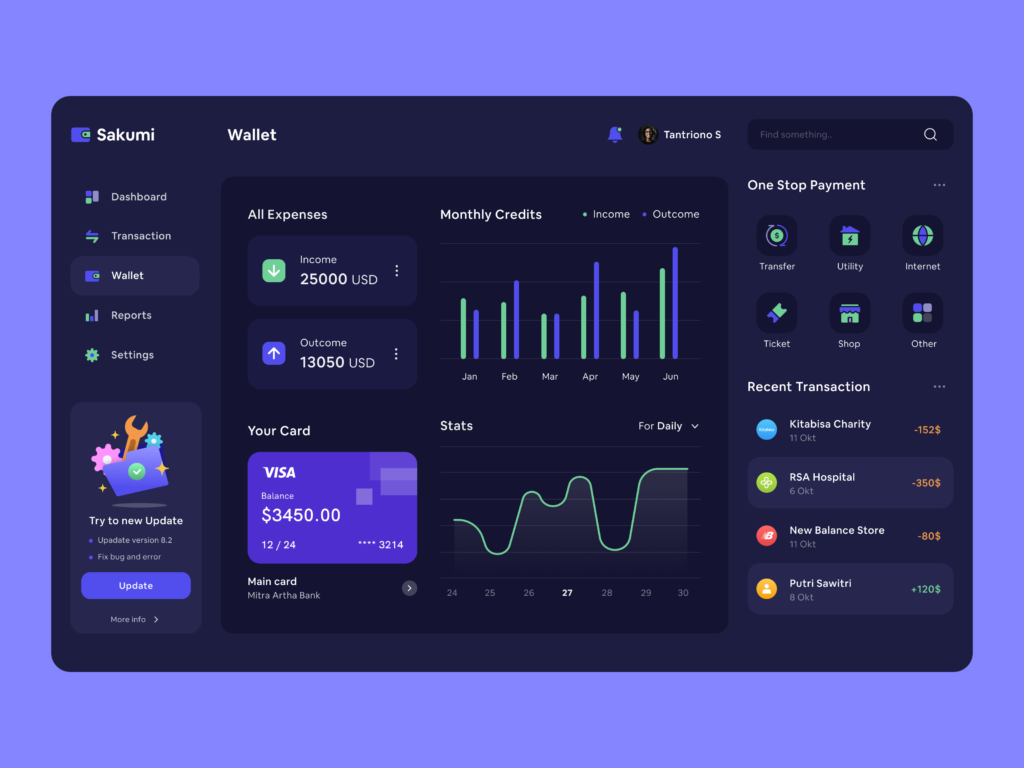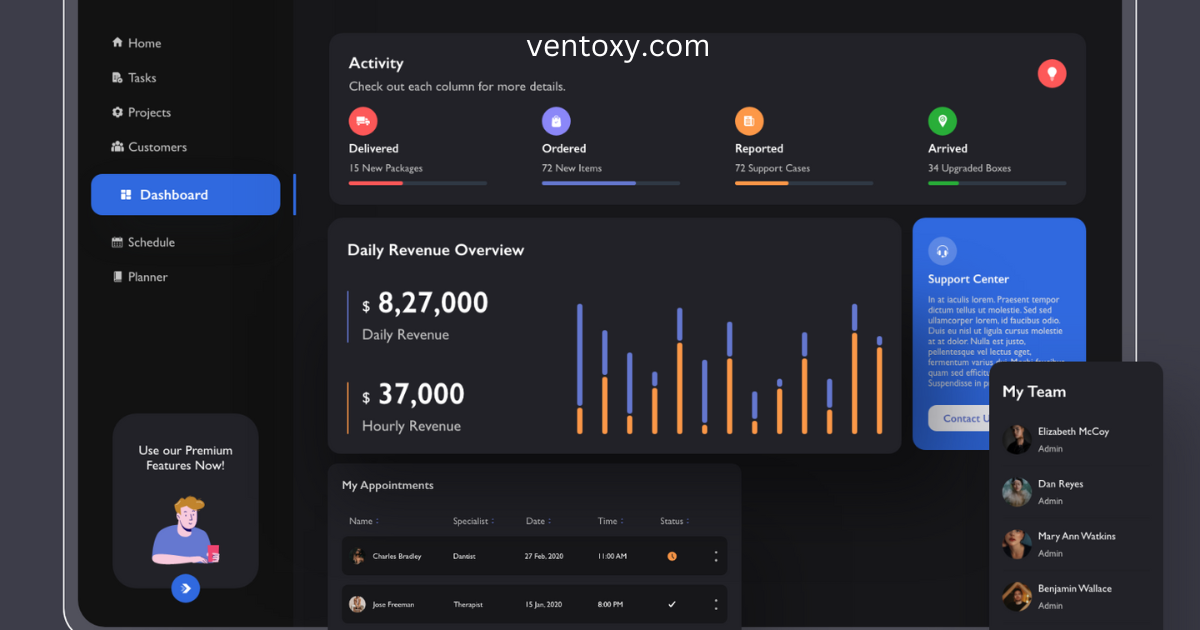In the fast-paced world of digital application management, staying on top of every aspect of performance, user engagement, and operational efficiency is crucial. This is where the “Core App Dashboard” comes into play, a powerful tool designed to streamline application management by providing real-time insights and control. This article explores a core app dashboard’s features, benefits, and impact on app development and management.
What is a Core App Dashboard?
A Core App Dashboard is an integrated interface that allows app administrators and developers to monitor and manage their applications effectively. It consolidates various data points and operational controls into a user-friendly platform. From tracking user engagement metrics to managing system health and security settings, a core app dashboard offers a comprehensive real-time overview of an application’s performance.
Key Features of a Core App Dashboard
- Real-Time Analytics: It displays live data regarding app usage, user behaviour, and performance metrics, enabling timely decisions.
- User Management Controls: Administrators can manage user accounts and roles and access permissions directly from the dashboard.
- System Health Monitoring: It provides insights into the app’s technical performance, including server status, response times, and maintenance alerts.
- Configurable Alerts and Notifications: Customizable notifications alert administrators about critical issues or app performance changes.
- Security Oversight: Features to monitor and manage the app’s security settings and user data protection.
Streamlining Application Management
- Centralized Control: By bringing together various management functionalities, the dashboard simplifies the oversight of the application, making it more efficient and less time-consuming.
- Data-Driven Decisions: Integrating analytics and reporting tools enables data-driven decision-making, improving app features and user experience.
- Proactive Problem Solving: Real-time monitoring allows for quick identification and resolution of issues, minimizing downtime and improving user satisfaction.
Enhancing User Experience and Developer Productivity
- Intuitive Design: With a focus on user experience, these dashboards are designed to be intuitive, making it easy for non-technical staff to navigate and understand.
- Customization and Scalability: They can be customized to meet the business’s specific needs and scale as the application grows.
- Collaboration Features: Many dashboards include tools to facilitate collaboration among team members, streamlining the development and management process.
The Impact of Core App Dashboards
The introduction of core app dashboards has revolutionized the way applications are managed. They offer a blend of efficiency, control, and insight, leading to:
- Improved application performance and reliability.
- Enhanced user engagement and satisfaction.
- More effective and efficient management processes.
Leveraging Automation and AI in Core App Dashboards
Integrating automation and AI technologies stands out as a significant trend as we delve further into the future of core app dashboards. These advancements will further streamline application management by automating routine tasks and providing predictive insights:
- Automated Reporting: Dashboards will increasingly use automation to generate regular reports, offering consistent insights without manual intervention.
- Predictive Maintenance: AI algorithms could predict potential system issues, allowing for preemptive maintenance and reducing downtime.
- User Behavior Analysis: Advanced AI could analyze patterns in user behaviour, providing suggestions for app improvements tailored to user needs.
Enhancing Security Measures
In an era where data breaches and cyber threats are rampant, core app dashboards are evolving to include more robust security features:
- Real-Time Security Alerts: Immediate notifications about potential security threats, enabling quick response to safeguard the application.
- Advanced Encryption Techniques: Implementing state-of-the-art encryption to protect sensitive user data.
- Compliance Tracking: Features to ensure the app complies with the latest data protection regulations and standards.
Fostering a Data-Driven Culture
Core app dashboards are crucial in promoting a data-driven culture within organizations. By making data more accessible and understandable, they empower teams to make informed decisions:
- Democratization of Data: Dashboards designed for accessibility ensure that team members can leverage data insights at all levels.
- Visualization Tools: Advanced data visualization tools make complex data more digestible, facilitating clearer understanding and decision-making.
- Collaborative Data Analysis: Features that enable teams to collaboratively analyze data, encouraging a more inclusive approach to decision-making.
Integrating with Broader Business Ecosystems
Future developments in core app dashboards will likely include better integration with the broader business ecosystem:
- Cross-Platform Integration: Seamless integration with other business tools and platforms, from CRM systems to marketing analytics.
- Workflow Automation: Connecting the dashboard with other business processes for streamlined workflow automation.
- Customizable APIs: Offering customizable APIs for businesses to integrate their unique tools and systems with the dashboard.
Emphasizing User-Centric Design in Core App Dashboards
As we look to the future, core app dashboards are expected to place an even greater emphasis on user-centric design. This shift is aimed at ensuring that these dashboards are not only functional but also enjoyable and intuitive to use:
- Personalized User Experiences: Advanced customization options allow users to tailor the dashboard to their needs and preferences.
- Intuitive Navigation: Enhanced user interface designs will simplify navigation, making it easier for users of all skill levels to find what they need quickly.
- Accessibility Improvements: Greater attention will be paid to making dashboards accessible to users with disabilities, ensuring inclusivity.
Advanced-Data Integration and Management
Data integration and management are critical components of core app dashboards, and these features are expected to become more advanced:
- Seamless Data Synchronization: Improved real-time capabilities for synchronizing data across various platforms and devices.
- Enhanced Data Storage Solutions: Implementing more efficient and secure data storage solutions to handle the increasing volume of data.
- Sophisticated Data Processing: Utilizing more powerful algorithms for processing large datasets, providing deeper insights and analytics.
Cloud-Native Dashboards and Scalability
The trend towards cloud-native applications suggests that core app dashboards will increasingly be built with a cloud-first approach:
- High Scalability: Cloud-native dashboards will be inherently scalable and able to accommodate the growing needs of a business without compromising performance.
- Global Accessibility: Such dashboards will ensure global accessibility, allowing teams to collaborate and access data from anywhere.
- Reduced Overhead Costs: By leveraging cloud infrastructures, businesses can reduce costs associated with on-premises hardware and maintenance.
The Role of Core App Dashboards in Decision-Making
Core app dashboards are set to play a more integral role in organizational decision-making processes:
- Strategic Planning: By providing comprehensive insights into application performance and user behaviour, dashboards will become critical tools in strategic business planning.
- Risk Management: Enhanced analytical capabilities will help identify and mitigate risks before they become critical.
- Market Trend Analysis: Integration of market trend data will enable businesses to align their applications more closely with market demands.

Future Directions
As technology evolves, so will the features and capabilities of core app dashboards. We can expect more advanced integrations, such as AI-driven analytics for predictive insights, and a stronger focus on mobile responsiveness and cloud-based solutions for greater accessibility.
Conclusion: A Vital Tool for the Digital Age
In summary, the core app dashboard is evolving into a vital tool for businesses in the digital age. It’s not just about monitoring and managing applications; it’s about empowering businesses with the insights and controls they need to succeed in a competitive landscape. With advancements in AI, cloud computing, and user-centric design, core app dashboards will continue to become more sophisticated, integrated, and essential to businesses. They represent a convergence of technology, strategy, and user experience, pivotal in driving digital transformation and business success.
